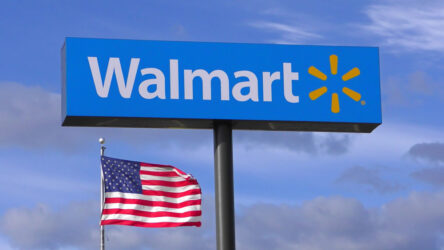Walmart’s Plan to Save a Critical Part of the Market
Joel Salatin|September 13, 2022

If we’ve learned one thing over the past two-plus years, it’s that when people in power muse about things, we need to take what they say seriously.
When the World Economic Forum held a dry run on how the world would or should react to a pandemic, most folks dismissed it as foolishness.
When Biden promised to change things in a big way, nobody thought the changes would or could be as profound as they have turned out to be.
And when Vladimir Putin presented his game plan for annexing Ukraine nearly a decade ago, everybody thought he was just blowing smoke.
With these recent occurrences in mind, let’s realize that prophecies from Biden and other top-ranking folks that food shortages are coming soon likely have some merit.
In the boardrooms of big business, pressure is building on many fronts to confront supply chain issues. Anyone reading business news knows that “just in case” has replaced its cousin “just in time” as the inventory phrase du jour.
How many of us remember when “just in time inventory” became the catchphrase of modern, high-tech global business?
We thought it would be here to stay. We applauded ourselves for creating such a techno-glitzy, foolproof, efficient system.
But in recent days, businesses have abandoned efficiency for resiliency.
A New Alliance
The old system is fraying around the edges. It’s creating a frenzy of new alliances, supply chains and protocols. We could call it a “circle the wagons” mentality because almost nobody trusts the suppliers they’ve used in the past to deliver.
That’s the background for the grand announcement that came earlier this month: Walmart is teaming up with a group of Nebraskan ranchers to build a smaller abattoir (slaughterhouse) to serve the middle of the country.
Like most large retailers, Walmart has depended on the “big four” meat processors (Cargill, JBS USA, Tyson Foods and National Beef Packing) – which control 85% of the business – to bring a steady supply to their meat counters.
No more.
Can you imagine the kind of angst and internal examination it must have taken for an outfit like Walmart to realize it needed to build its own abattoir? That is not a simple decision. I guarantee you it was made reluctantly. Nobody in Walmart’s halls of power has been yearning to get into the slaughter business.
It illustrates just how fragile and untrustworthy things have gotten. Walmart is partnering with North Platte, Nebraska-based Sustainable Beef to ensure it has a steady supply of beef for its Midwestern outlets.
Unlike those of the big four, however, this will be a small plant, requiring only 800 employees and processing only 1,500 animals per day. A Wall Street Journal article describing the arrangement highlights the fact that this is a small plant… and that the days of the big plant may be over.
“Meatpacking industry executives and analysts have said building and staffing more large-scale processing plants will be difficult given the shortage of labor and rising building costs,” the article states.
In the next sentence, however, we read that “executives of meatpacking companies have said that a heavy reliance on a network of small processors would increase meat prices and further complicate supply chains.”
That assessment is juxtaposed with the attitude of ranchers, who are “upset by years of low cattle prices despite the rise of wholesale beef prices over the course of the pandemic.”
Let me connect these dots for you.
Market Forces at Work
The big four meat packers don’t want this competition and even say it will “complicate supply chains.”
Should we all take a moment to laugh about this? The whole reason for this partnership is that Walmart lost trust in the big four to come through with a stable supply. The notion that competition will complicate supply chains is a joke. Competition offers more alternatives – more links in the chain, if you will.
Realize, too, that what is being considered a “smaller plant” is going to process 1,500 beef animals per day. That’s more than 40 tractor trailer loads. We’re talking about 600,000 pounds of guts per day.
But in Walmart’s mind, that’s enough smaller than the big guys to make its supply chain nimbler. It’s far more trustworthy than a mega-processing facility.
Isn’t it fascinating that the big four processors are poo-pooing this new arrangement?
In this saga, clearly Walmart is emerging as a friend to ranchers who want more competition in the marketplace. The ranchers’ enemy is the meat processors.
What an interesting dynamic.
While I’m no friend of Walmart – or even this ecologically degenerating feedlot beef – I have to give kudos where they’re due. In this case, Walmart gets a high-five for courageously teaming up with a group of ranchers to create more competition.
I for one am thrilled that someone is taking on the big four and threatening their power. And it’s being done without government intervention. This is truly a case of market forces at work.
How cool is that?

Joel Salatin
Joel Salatin calls himself a Christian libertarian environmentalist capitalist lunatic farmer. Others who like him call him the most famous farmer in the world, the high priest of the pasture, and the most eclectic thinker from Virginia since Thomas Jefferson. Those who don’t like him call him a bioterrorist, Typhoid Mary, a charlatan, and a starvation advocate. With a room full of debate trophies from high school and college days, 12 published books, and a thriving multigenerational family farm, he draws on a lifetime of food, farming and fantasy to entertain and inspire audiences around the world.



